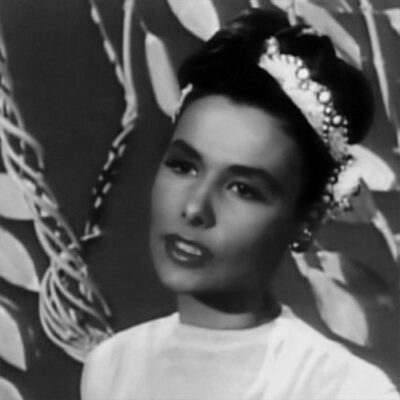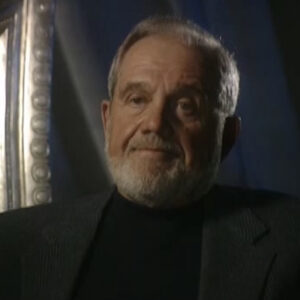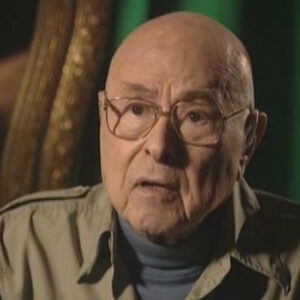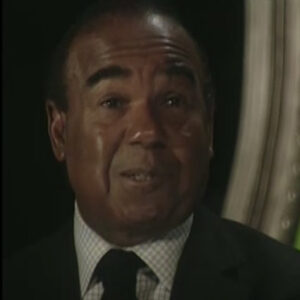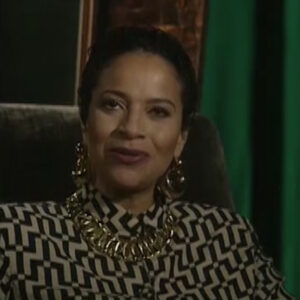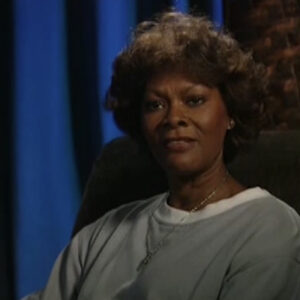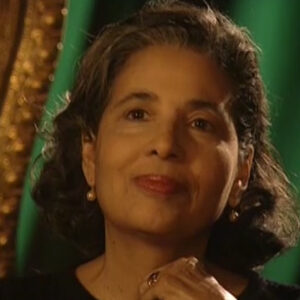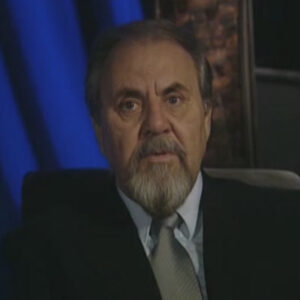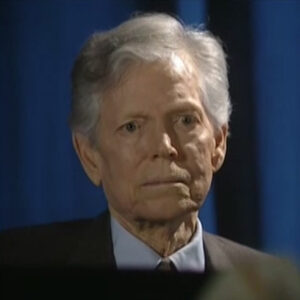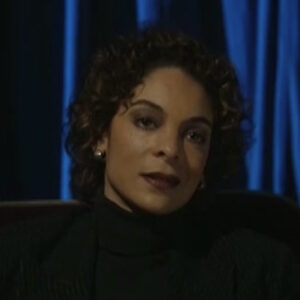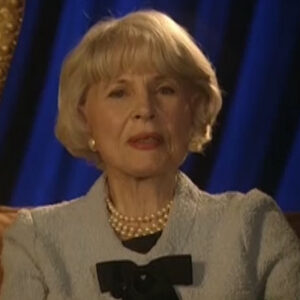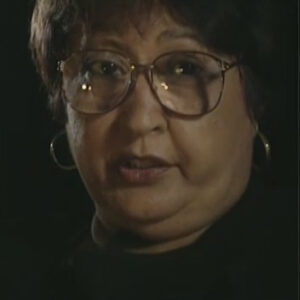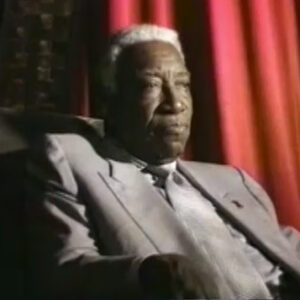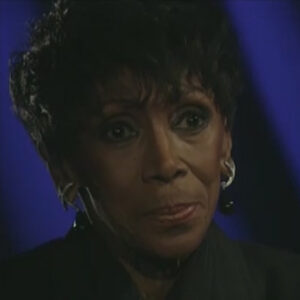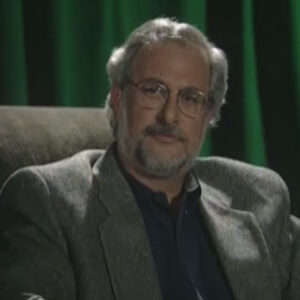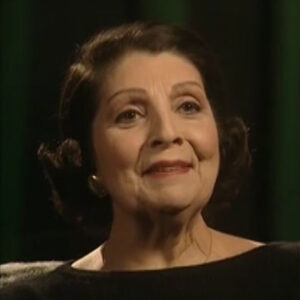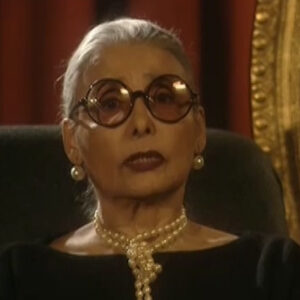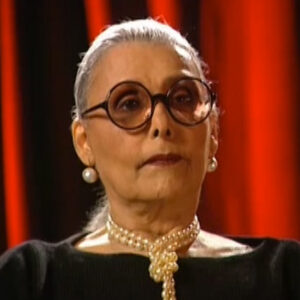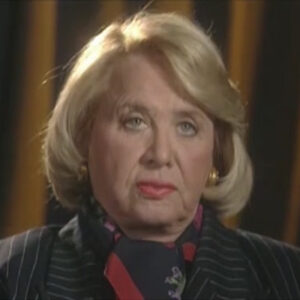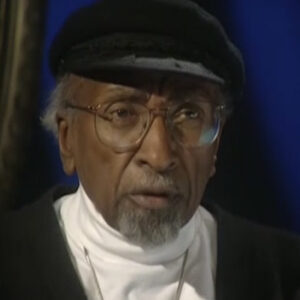Speaker Who taught you the first thing you ever learned about singing?
Speaker I wasn’t taught I was watching the stars in the Cotton Club who were singing Cab Calloway and Ed Ward, and I think my mother took me to a vocal coach and I don’t remember his name, but I went about two times and. I guess he must have taught me, but right after after that, I got in a cotton club and learned from the best.
Speaker When you when you were first starting to sing. Who did you enjoy listening to?
Speaker Ella Fitzgerald, I think, and because my grand father played classical music and Bert Williams records in my grandmother’s house, so I listen to them. And it was always a performer that was the living and making the sounds that I liked, it wasn’t something I heard from somebody I had never heard of, you know, but Burt was a great lesson. And then my grandfather had told me that he had seen Florence Mills and kind of just grabbed her voice to me. And when I went somewhere, my mother left me with a family. And somewhere in Florida, I must have been a lot of music being played in the house and the rock on the records, because that’s where I learned you got the right key. But the wrong key hole. That’s, I think the first song I learned after the album Pussycat when I was younger. I know I’ve had a funny education.
Speaker Well, when you were at the oh oh. Can we cover this one with the. At the Cotton Club.
Speaker What did what did you learn from Cab Calloway?
Speaker The same thing I learned from Peter Ward and about and his extreme professionalism, I mean, I well, I learned that from her to get to work on time, know what you’re doing and try not to fall.
Speaker As as you develop as a singer. What was it that you were looking for to get into your sound? What did you have a sense of what you want to sound like now?
Speaker I only got into it because at the Cotton Club, I was out one night and only because my mother kept saying tell on the Cotton Club, people that are saying, let her sing. And a couple of times that I was allowed to sing, I couldn’t go beyond the one night because I got laryngitis every time early on and for a long time until I talked to Paul Paul Robeson about it. And he said, I have a post nasal drip. And you do, too. You know, he said certain things that they used to recommend my healing. Have it helped me. I didn’t turn out to be a singer. I didn’t I didn’t want to sing, especially because I hate the way I sounded. But I learned all those good advice things from so many people who did it well. And I always knew to take the advice of the one of his best and, you know, best on making it work. So I had to learn how to sing. And I’m still learning.
Speaker When you were with Noble. Mm hmm. Tell me what that experience was like.
Speaker Well, it was like part of my history. My people had already my my grandfather probably probably knew about him. I knew that he had the famous reputation from Europe, his band, The Noble Cecile’s and Jim Europe, that was his partner. And they were in it during the war years, First World War. They played for all the people, white people dancing. And then so when I when my mother got me the job with him, he started to say, I have to sing certain things. Well, I could always read, which is helpful and is what hummed told. And that’s how I muddle through with him. He would always sing along with me, were very romantic duo and, you know, said, do you have to be a lady? You have to be a lady and be well-spoken. And he said, never.
Speaker Do you remember any of the tunes that you sing with him. Love will find a way and stop this one might have to say with Noble says oh oh oh with Noble Sissel.
Speaker I sang a couple of his songs. He and he’ll be black also. And I sang Love Will Find a Way and oh Jennifer one please. Jams going from the old to the new.
Speaker Tell me about how you have been to conduct the normal.
Speaker We want to try and go on to Wilmington, Delaware. I think there’s a place to go there and I usually sat in front of the orchestra and patted my vagina while they there. And he got in. He was in the separate car and he had they had a terrible accident and he was hurt. And we were supposed to open that next day at Moonlight Gardens in Cincinnati. I think. Anyway, they said his his management and all like we came to rehearsal today and there was no normal Sissel and I used to wear these white white pants and reject, you know, and they said, look, you’ve got your uniform, you have to conduct the wear. And I said, work, you know, and, uh, but it it was sort of I think it was because I looked flashy.
Speaker It wasn’t had anything to do with technique, you know, so I waved the stick and people looked, stared. We got to get going. That was what was important.
Speaker Oh, people did more than stare at their headlines about I mean, weren’t you suddenly a hit hit?
Speaker Uh, I don’t think so. I mean, yeah, they did write it in the paper. But, you know, we were among the few people, black people who were entertainers in that park before. You must remember, I’ve been here a long time back in the good old bad old days. And now and I think they stood because suddenly they saw this girl doing this and stop dancing and looked. But I was a lot of firsts, you know.
Speaker I understand that the way you actually got to know this was through so annoying.
Speaker Yes, well, Flournoy will just tell us who Flournoy Miller was a great comedian and he had a partner. I think I forget his partner’s name.
Speaker And they were at the Cotton Club and the two of the shows I was in and they were like, like Mother and Susie are only, you know, better. I don’t mean that loud. They were interesting. And Flournoy Miller was very tall and very fair. And my mother, you know, went to that guy to get her out of this cotton club I was signed for.
Speaker She signed for a lifetime contract. And so we got together out of this club. So what can we do, Howard? So we really had to escape from the Cotton Club and go to Nashville, Sissel, because Florini said there’s a band, you know, there on your own is an old friend of mine. If you get up there, will give her the job. That’s how I got to him. But my mother had known him, you know.
Speaker Well, let’s talk a little bit about what you were escaping from. Now, the Cotton Club has this glamorous image. What was the Cotton Club? What was working?
Speaker Well, it was famous because I just needed to say, well, the Cotton Club was famous, I gather, and it had been running quite a long while in Harlem. It was pretty much like the set and the movie, like a cabin log cabin. And the stage was very low. And there was one box where our people could come up during the rehearsal time, previous times before we opened and sit in that box. And my father, my father and big gambling men, sporting men used to come there when Joe Lewis or another fighter was fighting in New York. And so my father would come to the club and see me and he could sit anywhere as long as the three or four the sportsmen were, you know, and they were dressed beautifully and they made everybody else and God look silly, you know. But anyway, it was owned by a couple of gangsters.
Speaker And when I wanted to get away because my harpist.
Speaker She was she’s married to that bunny brigs, he’s so fabulous, about age 20. Yeah, he’s fabulous.
Speaker OK, let’s just go back to the Cotton Club. Yeah, one of the things I remember, you had this wonderful phrase that you used. It was almost like you described being in the Cotton Club, sort of like the jewels in the pigsty.
Speaker Just tell me a little bit about what it was like to perform at the Cotton Club. You only 16?
Speaker Well, I was happy to have the job, you know, and when we needed it, my mother, my stepfather. And it was we all we people working there. When we came out on stage, we were elegantly put together.
Speaker You know, the people in the audience were rich white people, celebrities like Tallulah Bankhead and and even Josephine Baker. When she came in one time, she came by one night and the audience was all, you know, suits and money and everything. And we got twenty four of us were not two little rooms and we weren’t allowed to sit with the customers or anything like that. Uh, it was a sort of ghetto paravant, you know, and there were jobs for all the waiters were black and that was jobs for them and the wardrobe mistresses and all.
Speaker They we all had jobs there. There wasn’t a place where we wanted to be. We felt at home. But that was the workplace. And a lot of great talent worked there as stars and performers. And I was in the chorus and I just used to watch them all. It must have been schooling me, you know, all the while.
Speaker But, uh, my my stepfather, uh. I helped my mother.
Speaker They went to the owners and they said we’d like to get her out. I think my mother had an idea of a career for me, which I hadn’t had.
Speaker And they went and asked me atresia kind of roughly. And after I you know, it was kind of bad getting separation from me.
Speaker And when I did, we literally left town like we were escaping from somewhere with criminals.
Speaker And I went to Philadelphia, where I picked up Agosta and worked with Elvis so I couldn’t sing Worth the Goose, you know. But I knew from Sissel taught me how to walk out on stage and. I know, I don’t know, I had that command at my fingertips just to get to singing is what I had the problem with. And I don’t know, I guess I guess I was interesting to people. Uh. But they mainly had me because of the way I looked and the way I conducted myself. Meanwhile, I didn’t like the way I was singing, so it was nice to have a partner.
Speaker How did you get the Charlie Brown?
Speaker Well, you know, I got to Charlie Barnett after my marriage and I had left Pittsburgh and I was sitting in the Victoria’s movie house uptown.
Speaker I lived at the YWCA and I had no jobs. But my father was me, you know, enough to get my food and everything. I went to the movies and Clarence Williams, who was a choreographer at the Apollo, marvelous guy brother. He must have called the and for me. And he found out I was in the movies and, uh, I wasn’t able to get back with Cecil because times were bad. This was nineteen. Well, and he couldn’t hire me. And so I said, well, I was staying at the terrace. I said something will come up and he came, he came down the aisle and said, hey, you know, come on. So I came out and he says, Charlie Barnett is looking for a vocalist. He said his cigar is gone or something and you want to want the job. And I said, sure, you know, and so that’s how I I was went to the theater and went downstairs where they were rehearsing Charlie’s band and had to sing something for him. And he said, OK, you have the job, you know. Oh, but I tell you, it was it was a novelty. Billie Holiday was the first one, you know, and I came along there sometime after that and got the job.
Speaker And we just never said anything about any of this crap. Well, I just the one thing I just need. Yeah, if we can shorten that answer and just start with Clarence Thomas.
Speaker It’s Clarence Robinson. Yes. I was sitting in the theater that was about.
Speaker Oh, you thought it was my attorney. You can go ahead.
Speaker I think I got the job of Charlie Barnett because, look, Clarence Robinson came down the aisle in this movie theater where I was watching the movie and said and said Charlie Barnett needs a singer.
Speaker I said, well, yeah. And he said, go up to will go up to the theater and you can audition for it. So I did. It’s a nice home. Yeah. Yeah.
Speaker It’s great stuff. That wasn’t it.
Speaker If you could start, you know, I was sitting in the theater wondering how I can get a job in Clarence Robinson.
Speaker I was sitting in a movie house and in Harlem wondering whether I was going to get a job and nobody was around to give me any ideas.
Speaker And suddenly clown drums and came down the aisle. They and called me out and he said, Charlie Barnett needs an orchestra singer. And his his vocals got sick and you want to go to an audition. So I did.
Speaker And I think I sang because Dinah Washington had made Dinah Washington I love Dinah Shore had made a movie down Argenti in a way that was the song I sang for Charlie. And I think Charlie was was not like everybody else. He he knew a lot. And he’d been around like musicians and people for a long while. And I sort of liked him from the beginning. He didn’t have any. Baggage against what I was or who I was.
Speaker I remember reading and in person, which you wrote a long time ago, about that being a place where you really began to start to develop a sense of yourself as a singer. Tell me about.
Speaker Well, once I learned somebody is opening can be something.
Speaker Uh.
Speaker Once I learned how to try to trade my throat and my nose and staying out of air conditioning as much as possible, I began to think about what I was doing. And with Charlie, I didn’t always have the problem of thinking as I was thinking about being black, as I do frequently, and because it’s interesting to me to have other people’s reactions about anybody’s blackness, you know. So Charlie was so, you know, comfortable that I was able to relax quite a bit and not be uptight with him and angry and which I did get off on with a lot of people.
Speaker He made me settle down and sing one or two songs well, because his band was good and they had it was it was down, you know, and I began to think about being a singer.
Speaker One of the things, if you could tell me about. Standing up about standing backstage and listening to the various instrumentalists and how you began to try to craft a sound around them, I think that if I stayed at the Cotton Club longer, I might have had more lessons.
Speaker But I had I had other problems then and with my mother and my stepfather.
Speaker And I know it was nice up there on the stage, you know, and easy. But when you get into other situations that the other lean on gets into was.
Speaker It was difficult to concentrate all of just on what I wanted to do, and since I always got sick with vocally and everything, I thought it was a lost cause. But I could fake it, which I did for a long time. And until I was exposed to more musicians, everything I learned, I learned from them.
Speaker So I learned, well, Sissel was focused on me being representative of something, whereas Charlet and he had a couple of black members in his band. So. As unlike a noble Sissel, our man that I was working with couldn’t stay another hell, I couldn’t stay in any of the places, Canadian places and and but meanwhile, they played great music. And I was happy there with that. But I think other people didn’t understand that. I felt I was in safety with the musicians. I didn’t have that pressure parent and all that. And I’ve been I was made comfortable early on by making them a part of me.
Speaker Very good.
Speaker What was that something in there? Oh, it was.
Speaker Was there a particular sound you were trying to achieve for years?
Speaker I wanted to sing like, well, now I want to sound like Aretha Franklin, but back then I would have been happy to sound like Ella Fitzgerald. She was the greatest singer we had at that time. And we have now.
Speaker And then the girls in Cotton Club came and and said to me, you’re copying Ella too much, so you clean it up and have to get another adult. And Billie Holiday, well, she was a wonderful friend, wonderful, tragic and marvelous woman. And I listened to her.
Speaker I had the best people all around me all the time on stage. Speaking of that Catholic society, hmm, oh, nice job I ever had at Catholic society.
Speaker What was so good about it?
Speaker Well, it had an interracial audience, mixed audience first global level hadn’t been in that many, but that’s the first one here in New York. And I worked with How to Find Musicians, and it was Teddy Wilson’s orchestra. And he began to teach me to sing one. Oh, and Jesse heard on the drums and the Higgenbotham. He still love playing Trumbull and.
Speaker Great musicians, did he did he tell you to focus on anything in particular?
Speaker No, no. You know, I don’t know whether singers in those days felt that way.
Speaker I, I was I have you know, my focus has always been on the musicians.
Speaker I guess I forget about the audience and what I’m doing. I was I was lucky that I had so much to learn because it took me a long while to focus on, you know, what I was using.
Speaker And I became sure of my focus when I did lead into music because I had by then been exposed to black people coming to see me. And I felt so comfortable with them that I then evolved every seven years, you know. And so I knew then that I must focus 50 percent on the audience and 50 with me. And when I found how easy, not easy, but how happy it made me to have that other those other people come in to me that my focus got punched in right there. You don’t know what it means to me to. Well, it means terrible things like coming up in a in a time in an era which is so bad and not being able to focus on partly on my people, too, as well as the other people, that it was a release for me. Finally, and as I toured on the road with with black organizations, I got stronger and they just weren’t there because they couldn’t afford to originally come in when I began work and they weren’t welcome in cabarets. And I found out early that I had to work to pay musicians. I wanted the best always. So I worked in a lotta places that I don’t even go to anymore. But they paid the salary and by that I could get from a pianist, a permanent bass player, because they they were teaching me. And that’s why it took me so long to get my focus together.
Speaker Well, you know.
Speaker People who have heard you back in the Cafe Society, they talk about how you stood out, whether you felt you were standing up or not. Hmm. But where did you where did you learn to really focus on the lyrics?
Speaker Oh, from the very beginning, because I couldn’t do it vocally. But I read what they said, the writer of the song. And I’ve always been to talk anyway so I could picture making the sounds, but thinking about what the storyline was.
Speaker And I, I could always, you know, always emotionally get involved with the lyrics because they were telling stories. Maybe I wanted to be in, I wanted to be in Acapulco or down Argentinian way all these things. And I wanted to to sing a song by Gershwin and sound comfortable in it because they’ve been all around seeing everything.
Speaker So my association just was with them, with the message I wanted for any jewels or somebody had anything to your. Oh yes. What are you.
Speaker Well, he I just I think that Barney Josephson was one of my great teachers because he and Front had a wonderfully enlightened to nightclubs and I got interested in people working. I had never been around a whole lot of working people that black, but especially not with white. And they they were all sort of enlightened people. And I began to to feel a part of showbusiness. I began to feel maybe I had a part in it because the people that would come in reinforce that notion. And the people I worked with reinforce that because I was always talking about earning a living, having a job, working, mixing drinks, their children, my two kids. I learned from all that and knowing people like Paul and Walter White and other great singers, black ones and some women that sang so good. And I hadn’t worked then with Ethel Waters. And I know she was the star before I came in and her everybody just said, Oh, this great singer. I always had them around me. I learned everything from them and musicians. I don’t have anything in the outer world.
Speaker Oh, you were just talking about Paul Robeson when he first came to see you at the cafe. What was that like for you?
Speaker It was fabulous, I thought, but it got even better because, you know, my grandmother and she misses me. Oh, when when Paul Robeson came to the Cafe Society, I was thrilled he was coming. I was also thrilled to hear that Duke Ellington was coming in. They’d come in all the great musicians. And I was thrilled because when I went to his table, which I could do it Cafe Society, he said, I know your grandmother. She helped me get a scholarship to Rutgers, you know, and I was always happy to hear about my people, my grandma, my relatives and he and. I had questions about the fact that my own people hadn’t seen me very much and that I missed that, and he he told me, he said, don’t worry about they will they will come. They will like you. He said, but you must remember that everywhere you go, even in another country, the more fans you make, the more people you know that will help you when you come back to your starting point. And he’s right. You know, the exposure helped me tremendously. Also, when when you out with people like Paul Weiss and you have a sense of pride because you know a man that’s so proud and wonderful, you know, and.
Speaker He told you some really specific things about the Obama.
Speaker Yeah, what was what was Paul Wellstone tell me. My grandmother was a feisty little lady who fought on street corners to get a little teenage girls off the street, a place she worked with the Big Brothers and Sisters organization. And then he’d talk to me about what he went through and that my grandmother was with people who helped him, I and anybody they could talk to me about.
Speaker My grandmother, my grandfather was just case with me because I never left my very early.
Speaker You said that he sort of gave you a renewed sense of yourself. What does that mean? How you.
Speaker Well, that meant that he was an enlightened white man who understood some of the strictures and some of the anger, some of the attitudes that I had.
Speaker And because he was able to make sense and what he said, you need to back up. You said he was a white man.
Speaker Yeah. Barney Josephson. Oh, Paul. No, I didn’t know. I thought you’d switch to Barney about Paul. Yeah, I had. I finished about him. OK, what did I cut off about Paul?
Speaker He just you start finishing where he was talking about your grandmother. Yeah. You said that anything. And when we hear about them. Yes. It important. Yes.
Speaker I was asking you how he helped you get a stronger sense of yourself as a black person, because he told me that Paul told me that there were nice people and bad people, you know, Sunday school lesson all the world over. But I was mainly interested in my own people because I think also he gave me a fortification. I didn’t mean that. He gave me a sense of self because I was going to use all that history that had gone before. I was going to use that to make why Lena was here. I, I think it now and I see my great grandson, you know, I was here.
Speaker He gave me strength and an identity during this whole cafe society. Time to be a real opening for you because you came into contact with a lot of people. Could you tell me about that, what that whole experience was like for you?
Speaker Well, I was getting a little more money than I got in the garden club. That was one thing I was happy just to see. I had been in the south a lot and had been in New York a lot. And he taught me that I I was more important than these problems, because once you’ve got your back fix for the problem, then you can help be on that other side. And if you’re good and strong in that that situation, it works for the other part of you. I think he he made me aware that I had a right to feel certain ways because my people had been that way before me and my they had been doers, you know, some of them marching suffragettes, all this principals of schools, the organizers of education for Black people. And I was so proud of them, but I felt I had a right to that pride. And I. I used it.
Speaker Well, um.
Speaker Cafe Society was also I mean, up until you got to Cafe Society. You hadn’t had all that much experience now with both races.
Speaker No, I hadn’t any of that change. The first one came in the audience at the Cotton Club.
Speaker And the audiences that Paul talked about, Paul Robeson talked about, were all over this country, including China and France and everywhere. And and all that began to help because I saw white people being in trouble to attack every society. They had problems feeding their kids. But, you know, around and when I saw other people like that, then I could learn more about ease with myself. As Paul told me, the same thing happened in the sixties when black and white people were just together. And that struggle I liked I liked them. Then I was a little more he got a lot of my prejudice out of me. He Teddy Wilson, did Hazel Scott stare at the Uptown Cafe and now and her thing was great strength because she was from an island, she was from the West Indies, and it was another free person.
Speaker You know, I learned a lot from her.
Speaker I was always interested in what had happened.
Speaker Why did somebody and Barney’s Club you have to cut? I got a call.
Speaker OK. Well, OK.
Speaker I think you’re trying to get me on to the path that I finally got into literally back then with Barney Marni’s people, his friends, people, I work there.
Speaker I think they were they didn’t they might have felt different about me, but they didn’t ever show me. I don’t think Barney would have led it. He made me squeal because I didn’t have to worry about somebody sitting out in the front row saying, oh, yeah, she kept saying, oh, where’d you get that dress? And this man. And they he they got me comfortable with the audience. That was the beginning of it. But it was still the separate audience. So my goal was getting to the other side.
Speaker Well, one of the things I think that seemed so unique about that was audiences up until that time kept asking you, certainly white audiences to sing. What did that mean to sing?
Speaker Well, they didn’t come to the Cafe Society that garage violence was never there before that. Well, they didn’t ask Noble Cicely’s, you know, to let her because he wasn’t going let me be anything that they thought. And that generation was wrong for a black woman to be. He taught me about pride. And and Walter White is to tell me we don’t want you to be full of lipstick and be full of glam, not glamour and use the word. But they didn’t want me to be what that generation’s idea about a black woman was. They wanted to be beyond what the white woman was, you know, more pride, a better look in better dress, better attitude. And that’s why I like him. And I liked him so much and why I loved that job so much, because I worked for other owners, you know, and I’m sure a lot there were a lot of black women in show business who were not able to focus, like you saying, because they had to put up with a lot of crap. I put up with a lot of problems. And I was so lucky in that beginning that that I had people like that in my life. My mother never taught me a lot about being black. My dad had gone on out west and so I learned it from example.
Speaker And that was that was tough for me. I was good for me as learning how to sing. I guess the the singing was happening because inside me, I didn’t have as much stress.
Speaker And I was able to at least focus to that audience, I didn’t feel the same when I worked in Paramount there with with.
Speaker I banned the French.
Speaker Yeah, yeah, Charlie, I didn’t feel that with him, I just felt safe up there on the stage with him, but I didn’t have an audience that was, you know, anybody I could relate to. Hardly.
Speaker Well, when did you meet Billy Strayhorn?
Speaker I, I was I met Billy Strayhorn in a movie book, a movie picture scenario. I was in California the first year. They’re very unhappy because I didn’t want to be there, want to be back in New York. And I was watching a show called Jump for Joy. That was Duke Ellington.
Speaker And in the when the first intermission came, this man and I was sitting on the first second seat, I think. And this little man said, listen, I’m Billy Strayhorn. And Mr. Ellington asked me to come out and make sure you’re all right and you’re comfortable. And I don’t know if it’s he some people you meet and they shoot out of all, you know, have energy or something. And I said, oh, I’m fine, come sit down. And he said, I’ll stay with you till and take you backstage. When I play, the show is over. Now, this show is supposed to have had Dorothy Dandridge, that beautiful woman in and Herb Jeffries, he was in it as a singer and two or three other people and famous. So he sat there very quietly and I sat and watched the show. But all this while this thing between us was happening, it’s a current, you know, something. And from that night on, we were buddies and I had never had a brother.
Speaker I never had a sister. Always bar none of the other brothers and sisters thing. So I had mine with him. He he was wonderful. And he he played beautiful piano and and he was a friend of Luther. And this was my first year that we were working together. I wasn’t a pianist. I worked with him and he liked to go to the museum. He didn’t laugh at me for reading a book all the time. He he was just sensitive and he wrote beautiful music. I mean, that’s, uh and we had so many of the same reactions to the same things, you know. And he also talked about other musicians that I had known. And by the time I took him to meet before Lenny and I were married, we were together and I introduced them. And they both they both played similarly on piano and they both wrote music similarly. And they were musicians. So I was you know, he stayed my friend for a long, long time.
Speaker Do you have any favorite Strayhorn songs, Flowers or Love Something?
Speaker The whole most of the perfume. Sweet. You couldn’t tell the difference in in his playing or dukes they’d start and together the two pianos and then Duke would give up golf days. And this was rehearsal times, you know, and Billy would be playing and it sounded just like Duke or vice versa.
Speaker What was unique about Billy’s sound, about music?
Speaker Well, it’s like asking I’m talking about Billy sound. And now it’s like asking me what was what was the difference between Perry Como and, uh, my buddy who died, Billy Eckstine.
Speaker Except that one had a different type soul. And the other Billy had Billy had Billy Eckstine, you know, and. I don’t know, you know, you in your lifetime, he was part of my life, part of my learning things, part of my listening to more music, part of not worrying about coming in the back door. You know, of all my musicians, some that we worked in, places that, you know, were not really nice places, but he he taught me he he’d been around on that bus with the Ellington Orchestra, sitting with all my while he’s writing music, you know, eating ice cream and writing music. It was Duke. And when he could get away, he’d come out to California with me. If I was in someplace else, he’d come in on his vacation time. He was my only and my closest buddy at that time. I can’t remember anybody else I was close to. I loved Billy Eckstine and and many other musicians. But Billy was different. He was like a brother, only more intensely so because I never had to fight with him, like I would have had to with a brother.
Speaker I think when he came out to California, didn’t he help you get your mom?
Speaker Oh, yes. He was that kind of friend. He helped me working wise and otherwise, you know. And in California, I had this job to get at a place called a little truck, and I was going to have to make an audition for him. And so Billy got me together. What were I saying? Play for me? I rehearsed everything. And when I went to audition, I was comfortable. But he also prepared me for this job and it was another realm altogether. Movie people, everybody’s a different audience, you know. And I worked I was supposed to work with Katherine Dunham and Ethel Waters and Duke on the same show together in the Cabaret. But then the the second war was starting and everybody was kind of a little aroused out there in California so that when I opened, we were not in the original cabaret. We hoped because they couldn’t get building material that easily. Then we were getting it was just a war coming. And California got nervous early, early on the track was very elegant and was kind of I mean, glamorous people came and they were not always elegant people, but they were when they came in there. And it’s a whole system out there in California. The different caste system of the ones who make more money, the ones who do cowboy shows are the ones that do serious kind of movies. And besides that, all the audience was always full of glamorous women all the time. And it was a little place we worked in because you couldn’t get in a big place. I didn’t have to use a microphone. And I went out to the table with Marlena Dietrich, Lana Turner and those people. But it it it helped me there because I get singing stronger because I didn’t have to use a mic and I never liked the mic sound anyway, so it was in another venue. Whatever.
Speaker How did the two of you choose the material you want to sing?
Speaker Well, he really wasn’t all musicians.
Speaker You know, they they don’t have their way. We didn’t think about rock and roll then we didn’t think about. So it wasn’t accepted. The audiences love Dinah Washington and like me, like I do, and they listen to Billy. But this was out in Hollywood, which is a whole other different thing. And I was never unfortunately at that time, I was never impressed with because I’d seen the best, you know, Mrs. Roosevelt, Mr. Roosevelt, Paul Robeson, Catherine Dunham, I’d seen the best. So I was able to work to them and see what they were wearing or what jewelry they had. But it was a whole other venue, not like any other club I’d worked and people started coming from the sound department and MGM. I told Lenny Heyden, my husband, there’s this thing. She’s good, you know. And when he met me finally he said I wasn’t going to believe anything they said because they will say, you so great. I had to make up my own mind. But anyway, then he would go everywhere with me and he made me strong for the audition and I got it. Got the job. And Fillmore came in to play piano and read Calanda on bass. Always great bass players. And I was storing up. Hello. You know, I would start storing up the things that were important to me.
Speaker Do you remember the night that Roger Edens?
Speaker Yeah, he came a couple of times, but he came one night is his name. Roger Eaton came one night to Cafe Society, and I didn’t know about him or anything, but I kept his side of the truck. I didn’t know anything about him, but he came not backstage. There was no backstage go over to the corner where I was and said, how do you do? You know, and the accent, he was southern everything but very nice. And he said, Do you mind if I get someone to bring you out to MGM? And yeah, I think he has a bed. So I said, OK. And a couple of days later, a car came from the so-called manager I had and took me out to MGM and Roger took me and Arthur Freed that. And it was very musical. And he said, listen to her, you know, and I was just singing ballads there and things. And Billy wasn’t there. But they said Roger played the piano for me and I sang. Oh, I don’t know. I don’t I don’t think it’s important. But then they took me around to all the producer’s offices, and that’s where I ran into Vincent Minnelli, who was another part of my life. I sang the one. I sang songs, I sang, I sang my mama then told me, you know, blues in the night I sang Summertime. I sang a lot of Gershwin, a lot of Rodgers and Hart, and I sang a lot of all the European composers that we all sang that. And and Billy even sang some of those songs. But she had own I don’t mean Bill Israel. I mean Billie Holiday. She had her own thing. She I didn’t have mine yet. I still haven’t to my satisfaction, but I sang. Songs like that, Oh, Honeysuckle Rose.
Speaker Duke Ellington, couple of his songs, but not like I sang sang now for.
Speaker The.
Speaker Miss Wilson, I am so sorry I got to remember the name of the word you think about.
Speaker Now I’m thinking about as well as different from when I sang for National Council of Negro Women. Yeah. And it’s it’s really too sad here.
Speaker Well, one of the things I noticed I saw there was taps.
Speaker Oh, God. Gayle was just about one month, two months old.
Speaker And your style of I had no style, you know, I had no style and I made the two stops. I hadn’t even seen as much well, styling as I began to get stops. She had she was just a couple of months old and we needed some money. And this so-called manager called me and said, come to New York. And I gave me new and you got the job of Charlie. And then I went out there and. I lost my train. What was it this afternoon, we stopped. Yeah, when I made the Duke stops, I’ll speak about it physically. My belly was still not down where you get when you have baby. And I was very lonely for my husband and I didn’t want to go. But as I said, we needed the money. So I got on. I think that was probably the first time I was on an airplane because after that I brought you out of an airplane. I, uh, I needed the money and I had a little nothing dress on when I went to audition. And Billy had helped me so that I was able to be up there, that MGM and all these big wigs and feel that I didn’t give them I mean, I wasn’t that hot about being in the movies, which is true. And it wasn’t until my father I called him on the phone and told him to come out and tell me what to do. And we were on and off together through my lifetime. And so he went with me to MGM and they he came we went up to Arthur Freed’s office. And so I went by, they talked and then they took me up and my father to meet L.B. Mayer. And we had our talk. My father said, no, you really want this stuff? And I said, no, I want to get back to New York, you know? And so they took him and he went in there with to with me to Mr. Elby mayor’s office. Fred was there. And I and my father was just gorgeous and beautifully dressed and sat down. First thing he said. Now, Mr. Mayor, I don’t really like this and I don’t want my daughter to be in the movies. So I was just echoing what I had said to him. I was being taken away from Strayhorn, from Duke, from all the people that I love. So I said, well, Mr. Mayor said to him, because my father was looking at him like this, he said, Oh, Mr. Hahn. Well, we, uh, we would like so much to have your daughter in the movies. And what do you what do you think about it? And my father, you know, my father said, well, I don’t think anything about it because I don’t want to be in the movies. So I don’t wanna be introduced by Joggle Folk Commentary’s and Tarzan or, uh, I’m a maid. So I said, uh, Sunanda, I’ve seen some great maids, you know, don’t say that, Papa, but he did his that and how I made for my daughter. I don’t want to play nobody’s maid. So I’m sure, Mr. Mayor, the get this brought out anyway. I said, oh no, Mr. Horne, don’t worry. We’re not going to do anything to to.
Speaker Not be up to par. We know we like her very much. So my father and I, we left and he’s. Are you sure you want to go through this? So I said, yeah, and then I can have my babies out there with me and and I love him. So I submitted a seven year contract.
Speaker Well, before that happens and something happened with Count Basie.
Speaker Well, Count Basie, I loved them. And he’s the one that when I came, I ran away from them and came to New York on New Year’s Christmas and the Christmas week. And it was Cole and Charlie Barnett and Basie and all the guys were down there in Blue Birdland. And as I began to cry because I had champagne with them and I said, I don’t want to go back, don’t put me on the train.
Speaker I do not want to go back tomorrow and basis just a minute. He said, you got to go back. He said, because they took you and he says, you got to be there and make sure none of our other people are disgraced and all this nonsense. And he just read me, said, you know, they’ve chosen you. You got to go back whether you want to or not and carry on the attitude and everything. I know he had something. He was right because I had worked in Washington after I made that first movie and a very famous black bandleader was on the bill. He was starring, I guess. No, he wasn’t. I was starring. But anyway, he said, you know, who the hell do you think you are? He said there are thousands of black women who are prettier, more glamorous and can sing better. And I have never forgotten it. That was told me the first. And he’s right, you know. And so my father was right and telling me, do it or don’t do it. But Bessie was right because he knows then in those years that they didn’t have enough of us to be representative. And they always, you know, it’s very hard to break ground and you don’t know you’re breaking it, but you wear something, you know, bother you. And I mean, my people, the ones that are my uncles and everything, they were you know, I’m so glad it’s changed now. And you can be a whore. You can be a murderous. I’ll be anything you want to be.
Speaker Well, Walter White of the NAACP, also after you’d like to go back oh year because they want to break the union.
Speaker First of all, just tell me who was Walter White was at the leader of the NAACP during the years I’m talking about. And Walter was a fabulous man who was very, very white, like his name, and went all south with the lynchings and to and they thought he was another one of them. And they got material to have the NAACP fight against lynching. So, uh.
Speaker It was just anything that he said he also knew my grandmother and I were going to have a group of teachers, I guess. All right, Basie, Ellington, Strayhorn, Walter White, Paul Robeson, uh, Manelli as an artist, you know.
Speaker And the National Council of Negro Women and Delta was but was Walter White at that time agitating for you to go to Hollywood and do this?
Speaker You, Walter White and NBC wanted me to go back to Hollywood because I had become the means of breaking into the unions. The white people in the union were suffering, too, but there were no blacks and there was no hairdresser. So they got in a system for me and Sidney would do all the work, but she got a job and I got in black musicians because I can’t sing along with that, you know, and a little games. We all play with each other and they wanted me to be exemplary, all the white and these other people, because that made it seem like I was representing all black women in the world, have a job, you know, but they wanted in that era us to create some kind of marvelous picture, which has nothing to do with life, you know, but and eventually they got more black people out there.
Speaker Well, what was different about telling you to go back?
Speaker Oh, yeah, it’s different because we’re I’m not a musician, but we were artists, you know. See, Billy Eckstine was telling me the same thing, and I just knew all the right people and. They they they I think they felt sorry for me in a way, but because it wasn’t easy trying to be. Exemplary when you’re not, you know, but that’s another lesson you learn.
Speaker When you got down on. Here you are, the example.
Speaker And a lot of your own people in Hollywood weren’t feeling that way about you.
Speaker Well, a lot of my own people had Katherine Dunham was an example. She must have gone to Alala and Dorothy Dandridge had been working in movies and she was a little girl there and. It it was it was an artificial thing anyway, so while I was learning to try to teach some of them to get off my case, the NAACP was fighting like crazy for many things. The Union for Jobs. And so if I had been silly about the whole thing and made their mistakes, they would have taken it out on other people. You know, it was silly in those days. You weren’t even there young people. But yeah, the thing about other people in the job, they had to play better and sing better and have better manners.
Speaker So back to singing better for a moment. Yeah. When you got to MGM, they were folks like, yeah. Tell me about Kenny at MGM.
Speaker I was a little uncomfortable because I was operating from the music department. All the guys, all the musicians were OK, not many black ones, but they began. I met Kay Thompson and she was working on two pictures with us. I forget what they were. I ran away. She was a New Yorker. You know, you go when you’re a New Yorker and the Elders and you come to California. I mean, that’s that’s a foreign land, you know? And so you get to the New York people. I mean, that’s where, you know, Gene Kelly’s and and that everybody like that Kamden, when they were on the New York side. And I certainly wasn’t with anybody else because the clicks all over Hollywood in those days and the ones who were the made the most money were in a group and the ones who just did dancing and sang. And they were in a group and there was no there there’s no family for me out there. But I, I knew that they were doing the work. And when they got a somebody sent them a play that they said they wanted MGM, I think they’d already bought it. And they said, oh, you can be in this story because it’s about black people and it’s they didn’t say it that way, but a lot of wonderful people will be in it. And we want you to be the leading lady. And I said, well, what is and who wrote the music? I said, Well, Harold Arlen wrote music and they played it for me is beautiful music. And then they gave me a script.
Speaker And the first script was Now, mind you, I showed the script to the people I respected, you know, and it was about there was called In Life, I think George Stamos, Sandalow.
Speaker And it was another, you know, those shows that we know it was about, you know, a jockey and and broad was I mean, the girl was, you know, kind of honky tonk or whatever. And I showed it to the NAACP, some of the members of and they said, you can’t do this. It has all the stereotype language, stereotypical situations, and decided I wanted to go to New York and work in Showboat. So.
Speaker Finally, the the NAACP and a couple of the other unions were so dead set against it, and I was there because I know with all my talk, I can’t always sustain a completely jazzy idiom. I can’t remember those dialects so good. I know a few now, but I was very serious. I did turn it down, but the repercussions were awful. And I was put on suspension and and a sister wrote and said, well, if Lena won’t do it, I will do it or my sister will do it. And when I found out a sister had written that, I felt kind of bad. But that’s life. You know, if you don’t do it, somebody else will do somebody somewhere.
Speaker And what did happen? What happened? Refused to do it.
Speaker Well, they put me on suspension, took me off pay salary, and I was like curtailed, cut away a lot of the places that I had begun to work in.
Speaker And they only allowed me to work in a cabaret outfit that they had put money that was in Chicago at the Shappi. But I was cut off a lot even before a journalist.
Speaker And McCarthy, you know, what do you think that not doing St.Louis woman is the reason that you didn’t get to do show?
Speaker No, because the request for me came from New York to do johnboat during that time, about a month after. And they said, we’re not gonna let her go, you know, keep a punisher. You know, we’ll keep our salary and she can work in one of the cabarets. But no, Shobha, that was my first sort of disappointment.
Speaker Well, at this time, also, this is when you met Lenny.
Speaker Yeah, he was in the music department. I met Lenny Watt while I was there with my second year. I was there. He was in the music department and I really hadn’t paid too much attention. But then I got very angry with him because I heard him say, come on up to the sound booth and we’re going to play a cover Honeysuckle Rose. This girl has done and I I was with the musician that was going to run the tape on tape, whatever, and I heard his voice in the back and he said they’ll never let that get past the censor. And I got so mad and I said, Who said that? And I know it was him. And I don’t know what his attitude was, but I disliked him tremendously from then on until until one day it happened.
Speaker Well. Well, musically. Mm hmm. During this time, we were changing. Oh, yeah. You had your delivery.
Speaker Well, you see, I was learning from the audience and I learned a case. What audience wanted? Certain things, certain attitudes. I worked. And, uh, and Paramatta all laugh a lot. And one night I did a big benefit. And Joan Crawford came to me later and said, you know, we just love you, but it’s not nice. You shouldn’t think I was singing a song called On the Side of the Railroad Tracks. And, you know, with Friday song, I’m True and now and she got upset by it. But I can’t blame her because on the other hand, she went to came to me and said, look, you try to buy out your contract because she said, I’ve been through this and go to MCI. Yeah, I forget his name used to be the president. Go there and get them to get you out of this Cadillac, but fight about it, you know, really, because I was just saying, well, OK, now. And so I forgave her for next time. She saw me in the club.
Speaker I went and saw you say, what is that on the wrong side of the railroad track where the man.
Speaker John Latouche wrote, I think the words well, anyway, it was from Dog Show, and I loved it.
Speaker I can’t think that what the name of one of the things that Luther Henderson was reminding me was that when you open the door and you had to go through a whole lot to make sure that everybody got into the audience. Yeah. And you sort of you sort of turn the knife in a little bit when you did jump for joy.
Speaker No, I loved it because I was mean. And what I said, you know, if you don’t look at the lyrics of the song that I don’t read, so you can be casual about it. But that was right on the button.
Speaker What was tell me about Jump for Joy and what Del was a great show and my little brown book in Jump for Joy that I saw when I met Billy Strayhorn. There were great songs, my little brown book Jump for Joy, the wrong side of a railroad track of two or three others. But they were saying, What do I think? And what we people used to think and and believe was somebody in a storybook. But with all the lilies outside here, they were, I guess, politically correct songs for me. And I think Jump for Joy was ahead of its time, really. It was beautifully dressed, beautiful people and a very red on button statement about the way we still brothers and sisters, you know, and it didn’t have a very long life. It played out there in California and. It was an inspiration to see it because I’m married to one of my friends, she was in it and a lot of good dancers and singers. It was about. There were sketches, skits, and a white guy named Sid Kulla wrote a lot of very literate libretto and there was a white and black mingling with the people who created the show, you know, and see, I hate to sound excited about all this, but you must remember that I spent a lot of time away from people who had time to read a book or to go to a theater of I had I lived with people who actually had shared the sweet potatoes with me and had nothing but knew what they wanted to have happen. I was always lucky to be around for what you know, right. Thinking people, no matter how bad they were after all. So that I liked. I like intelligence in situations, and so I was learning then, too, and I was I wasn’t learning to be friends with anybody, particularly at MGM, except I New Yorkers. And so I had no really I had no knowledge out there in that situation. But I got the name.
Speaker Oh.
Speaker Just to go back. Yeah. For a moment. Yes. I remember some of the lyrics. I remember Luther was singing, you know, way down south.
Speaker Yeah. Yeah. That’s the verse to jump for Joy.
Speaker If you could just give us a little bit of that, because it’s it was if I can remember, if you can wait outside and then down in the mouth, man, I know that I love singing the blues. We also singing the blues.
Speaker Oh, come on. I was enough.
Speaker I said I’m you know, I can’t no sheet music to that we can read.
Speaker Oh yeah. OK, we can I can remember my name sometime on.
Speaker Yes, sweet beat, an uninspired survivor hired and we got a new jump for joy, agree with that, don’t we believe all impounds, I do believe have been Khalaji through jump for joy. Have you seen pastors groovy green pastures with Delta Technicolor movie?
Speaker Mm hmm. When you meet all S.T., I tell that boy, tell a boy, hey, I don’t know how to eat something more than jump for joy.
Speaker Oh, good. So I’ll get it for you. And we are glad.
Speaker But while you were there in Hollywood. Yeah. Oh that’s that. Phillip Thompson. Yeah, I do.
Speaker I do. And well, anyway, Kate Jericho. Yes. Tell me about you. Well, Kaye has the great story about it, because I was told to make this picture. I do that. I think Red Skelton was there and he’s got going to be in. And I knew Hazel mother and we thought I’d liked each other all the time, you know, and she’d tell me about what it’s like to be on British Island where she was born. And we were supposed to meet at Kay Thompson’s office his first day. So I came in like I always do, and pass like Father Swearer or something and started to work with Kay because she’s a great teacher, katanas, a great teacher for singers. And she started to work with me. And in came the entrance of all divas, Hazel Scott Menck from head to toe God and I and I sat in my beat up my school. I felt like, oh, so OK, just Insana. She kept us up. We were hiding away. The second day I wore a mink coat all dressed up, came in and Hazel had switched her slacks. So we with one upmanship all over the place. OK, tell us about it. It was fun but and we both laughed at it too. So yeah, she was great. Years ago she was on my husband, Lenny Aydan had a great, great orchestra and Kay Thompson was one of the singers on that with the of the boys that I can’t think. But she was there as a singer. And so when I met her, I met her through him and we became friends. He was not of Hollywood. She can sing everything. She was wonderful. Jump for Joy was was politically, politically correct, I thought in those days and savor those southern south southern songs.
Speaker I’m getting tired, sweet and uninspired. Stamler they were now what was the first line?
Speaker We’re so fed up with this.
Speaker Yeah, yeah, we’re so tired of the south man, the wet towels and the mouth land, for all these years we’ve been bored to tears with the blues.
Speaker The Southern songs are getting tired. This we’ve been inspired. It’s time they were retired and we got new fare thee well. Then you can cut. That is out of style, honey child. Jump for joy, don’t you? Kriminal evil impounds. I do believe you have been killed ain’t you? Thrill jump for joy. Have you seen pasturelands groovy green pastures with just a technicolor move when you meet Ed when you go up to heaven and you meet all S.P., jump for joy walk right and give peace some skin and jump for joy.
Speaker I used to love to sing my song anyway. I love that song. I do too. Oh. Re Jericho, yeah, yeah, yeah, I just want to backtrack from. Yeah, this is what we were whispering about. Yeah, well when you first met Lenny, I could tell what happened.
Speaker Well, I couldn’t stand because he’d made that remark about my saying and and I couldn’t stand him because he was with when Vincent took me to a party, he was there with one of his friends, a comic named Rags Ragman and another partner of his. And they were making racist jokes, you know. And I overheard him and I told Vincent, we’ve got to leave here. I can’t stay. So, Vincent, no what had happened? And I told him so we went away. And that was another tally Mark I made against Lenny because I thought he he was like that with ignorant people, you know, and.
Speaker He wasn’t I mean, when did you find out it wasn’t like that?
Speaker Well, first of all, not because I love that same day that we recorded that we did. Jeriko, I was in the lunch having lunch earlier with Vincent. You got to help me do that again with something drink?
Speaker No, it just comes up when I made a.
Speaker Jericho Hazel Scott came and we were together and singing this number that Kay had done an arrangement where we had recorded the night before with a different and not with Lenny conducting, but another conductor. And Kay said to me, I wish Lenny was here because we’d have been through this in an hour. And it was hours and hours went by and thereby sitting in the music place. And I said, oh, is he a good conductor? She said, for singers, he’s perfect. And that’s just passed out of my mind. And then when we were recording joke, we were singing to the playback on stage. I looked over OK. I was standing there with Lenny and a couple of other people and oh, shut up, girl. And I said this again. I said, you know, I don’t like him. And I just looked over and he’s so when we got through part of it, she said to me, Have you met Lenny Haden?
Speaker I said, No, I don’t think so. No, I haven’t. I’ve seen him at a party. I don’t know him. She said, well, but how can he come over and meet you? So I said, Yeah, sure. And he came over there. Yeah, all that. And then the lunch break came and I’m sitting there with Vincent, other people. I can’t remember her.
Speaker And he came in and, you know, you get that look like good friends. They could occur and could. Yeah. Could yeah. And that’s it, you know. And then he played Hazel and me. We went over to the giant whale. The MGM crew used to go and he came in, they had a piano, a roll it up and started sitting down playing. Hazel sang. I sang it was it. That’s a nice thing. And.
Speaker That’s how I met him, and I told them later about his friend. He said, oh, he said he’s old fashioned and that’s the way he is. Well, we didn’t have any problem about color. I think probably it would have made it easier for us all around if if he knew all the problems and say, oh, she wakes up like that, you know, she just wakes up. There’s nothing wrong with her. He didn’t know all that that you carry around. But he was wonderful to me, too, for me, because he was a great musician and he was kind of pure in his attitude toward people. And he was like Billy Strayhorn. Well, Bobby Short was telling me that the two of you sometimes would go to the cockpit, go in and say, oh, well, we used to live on Hawthorne Avenue and we’d go, that was another club. It wasn’t famous. Now, like, it is some other. And Eddie and I can do a piano act of a girl and a man, woman and a man. They played all the New York songs, you know. So Lenny would come up my house and we take the car and go down. I was right at the foot of the hill, the street I lived on and we’d go late. I haven’t come from MGM. It was late and there weren’t many people in that place by then. And there and we know a for free, which is the best thing, you know, and they would play all the songs and and Bobby was there.
Speaker But, you know, I met Bobby Short in Paris, I think the first time he played at a facility, I think, and very young Bobby and playing and this very late night spot in Paris near my hotel. And I remember him all these years. And then we would see him when we come to New York, because, you know, all actors and actresses and musicians don’t know each other that good. We don’t always form foreign relationships, but of relationships that last because we go to places all over the place.
Speaker And so when we’re together, it’s usually at some point that has cachet with us.
Speaker And I when when we came back here, Bobby was working and I forget where he was and I went in the Savoy Plaza. So our lives are interlinked through the news, you know, but. There were the men when I got, you know, when Mr. McCarthy got on everybody’s backside and mine too, we went abroad, you know.
Speaker Do you remember one of the things that was so I remember that Bobby felt so moving was the time when you were doing your own version. Yeah. Yeah. Good morning. Heartache.
Speaker Yeah, I used to sing it. I love that song. Oh, that love man. I used to love to sing. Good Morning Heartache. You see it. That’s a Kastoria delta, you know. And everybody and I used to love love man. Everybody you can fall in love with that. I never sang them like Aretha. Unfortunately I wish I had. I like Billy. I wish I had. But at least I knew the right songs that you know. And yet, you know, even back then, Billy and a lot of performers had a very bad time, not because of all the things that colored girls, but people minds weren’t attuned to to intelligent interpretation of certain things. And the more that we sang them, at least we we sang them about each other and to each other. Sometimes they didn’t get it. But I, I think those singers that we revere, you know, and admire that. Carmen McRae, they always invested a lot of themselves in. So, you know, that’s so good.
Speaker You had a very special feeling.
Speaker Oh, yeah. Yeah.
Speaker Well, I met I didn’t meet her the first night I saw her at Cafe Society.
Speaker She sang Strange Fruit, among other things. And the first time I was taken down there for I was hired, she sang it and then she went to Kelly stable, which was kind of half way close, one more uptown. And I listened to, you know, not thinking about her technique or anything. It was just so personal for women, you know, other women and men, too, I guess. But she and she was so tragically beautiful and you just would stand there and, oh, you know, make make it back cares, rise up. And and so I went to her backstage. I asked and I asked if I could speak to a minute. And I told her, I said, you know, I’m this getting this job at Cafe Society and they want me to sing the blues. And I said, I’m not a blues singer. I don’t know how to sing the blues, and I can’t copy anybody. And I don’t want to copy you or try to they want me to sing fine and mellow. That was great. No, she said. And that’s why she told me. She says she said, I’m glad I met you because I hear you. I just starting to and you got two babies. And she said, you have to pay your rent. You have to pay the people who help you out.
Speaker She says, saying anything you want, whether it’s my son or somebody else’s. He said, because you were two or three different hats. And I had been told that by Hattie McDaniel and by Billie Holiday. And we did a lot of things. And those days and we still do now because we need to not offend the people that are paying to come and hear us, because we are not going to not give our selves to this audience because they are what makes us exist. And she she was like she was young, you know, but old fashioned an attitude like I am. I was. And she said, so go ahead and sing it.
Speaker I said, but I want sound rather. She said, that don’t matter. They look at you, they say they listen and they did. She was everywhere where she was when we were there, we’d go to her and Diana was the same way. Dinah Washington told me the same thing.
Speaker And Hattie McDaniel said, and I wear two hats when I go to work, I put that bandana. And she said, when I come home, I get into my t shirt and gown and have my beautiful China out.
Speaker And and I said, yeah, so I got to do that, too.
Speaker Oh, I had such great people around my my generation.
Speaker Why was it the.
Speaker Because a lot of people used to think everybody like me. Because the blues are all spiritual and I wanted to so badly but I just couldn’t. I think that was part of the picture that I put on people.
Speaker What was it that did not for me to sing?
Speaker It was what my first of all, my voice thing, where I sang from my stomach and whatever. I couldn’t sing the blues. And I think it was partly because my upbringing for one reason, my my grandparents didn’t particularly think that blues singers were there again, I would say, and they played my grandfather played, like I said, Bert Williams and opera. And when I went south, my mother didn’t want to hear the blues from me because she can sing the blues either.
Speaker But, uh, I was not I went to I would hear great singing in the Baptist Church, but I didn’t go to the church. I’m a Catholic and whoever happened to be with didn’t take me. And so I had no thing about the blues. And because John Hammond said, you know, she’s Cuban, she can’t sing the blues.
Speaker And I didn’t have it and I didn’t have the time there. And it’s too late. It’s too I. And first of all, I was there hiding my feelings from audiences. They didn’t know how I felt. And so a lot of the color and the focus came out at what I was getting in from certain people. Uh, I wanted to sing the blues desperately, but. I didn’t get it, but that’s OK. I appreciate them. I don’t like to even hear an opera singer sing the blues. Not that is, you know what I mean.
Speaker Most great blues singers came through on different schools, different audiences. They were the South. They worked. They were not working. There were women and street and blues now. And Barney said it would be so great if you could sing it, because everybody sitting in the audience is going to say, oh, no, man left her. She you know, you’re not the woman that, you know, would never have to sing the blues either, had put all that color in that, you know. And Duke Ellington is called the history of jazz. That’s what it is, people’s opinions.
Speaker I still wish I could sing Sing Blues, but for a while I wasn’t popular, the audiences like the Copa and Bill Miller’s Riviera and they don’t want the blues singer. They should have had but had one.
Speaker But what did they want? Well.
Speaker I don’t think I I don’t know what they wanted, especially they wanted a certain song sung by certain groups. I tell you, they took me in, I think, because.
Speaker I was dressed very well. I found that was important to the women in the audience. I.
Speaker They could hear every lie and I said articulate and.
Speaker It was theatrical when I’d sing a song like Jump for Joy and yet be in the world of standing there and all these silks and satins singing meaningfully that song, I love a lot of things I found in my head.
Speaker I had to be smart about it. So they never got I never got schoolin and all the great music that was around. When I was in Fort Benning, Georgia, I hear the kids singing had great choir and, uh, the high school that Malcolm was principal up and is a great choral singing at, but I never stayed in one place long enough to get any of it stuck to me because I was carded around one year, a single trial. You go into mysterious places and have mysterious things happen.
Speaker Billie Holiday. Yes, you ready when Barney Josephson asked me to sing the blues.
Speaker Ah, I went to one of the musicians, Teddy, probably all the drummer. I said, How do I get to Billie Holiday? And he said, she sang that Kelly Stables. So I went to Kelly’s stables and I asked to go to her dressing room and she met me at the door. Oh, great big dog and a little bitty dog.
Speaker And we found this, that she was so tragically beautiful. She became, you know, like a.. And I told her, I said, they’re trying to make me sing fine and mellow and things like that that you sang. And I don’t like to sing, try to imitate or copy other singers. And. And she told me, just do what you have to. You got two babies and you got Rand and you’ve got expenses. And she said, sing whatever they want you if you can do it, because she said, I wear two or three different hats. And I said, yeah, Miss Louis, Missouri. MacDaniels told me that she wears a bandanna to work and when she comes home, she takes it off and puts on the velvet PEMRA and and she wears so many hats, but we have to do it.
Speaker And from then on, I just swallowed that that intelligence so bright, you know, and you find your survival rate of tactics all the time useful put on the hat that the sophisticated audience wants and sing something right down there where they should be.
Speaker You know, when I look at some of your performances, just the way you account for me and please take this with the respect you were the Madonna of your generation.
Speaker Know that you crafted your image so well.
Speaker Oh, tag that. Where you know what went into that?
Speaker Well, I told you, I’m a New Yorker and I’m going with my grandmother to Baha’i meetings, helps her religion and knowing Katherine Dunham, who is beautifully done all the time and meeting, I even meeting in Allessio, who’s a friend of mine, who was a designer at NBC, who’s now. Oh, and another big outfit I learned about. I tell you, I watched people and I listen to them and I learned about because when your salary gets to be a little bigger, you can dress. And like he’s dressed in a place where you aren’t making that much money and you didn’t want to give it to musicians as much as I’d like to. You get on up and then you work in a new place where you got to be as dressed as well as the audience, if you know and and you’ve got to be on a par. I was still in my battle days, you know, my survival techniques. And one of the things that they used to say was she’s wonderfully dressed. You know, that’s part you keep who did her hair. That’s about, you know, how women and audiences pick apart, picked up. And I learned all that from observation. But when I was back in my own place and with my own whoever, I dressed a little differently because I would sit out on the floor and saying, and you can’t sit down in those tight, beautifully draped gowns that I used to wear.
Speaker You had what I called the Lena Horne wig because you could hardly walk.
Speaker That’s right. The designers, Bobby Macintosh used to design my clothes and they moved on over to France and had Chanel and Jacques, Faten and some of the French people. They dressed me. I learned from that and I watched who did I watch as the beside Billie or Billie Holiday or I’ll pick up some of our ladies in the other walk of life that were doctors or lawyers, had a beautiful gown.
Speaker You know, you see what’s going on around and you read iridescence, see what you should wear.
Speaker Oh, nice. I wouldn’t do I think I wouldn’t do that.
Speaker I wondering the owl and the pussycat to him. Well, that’s good.
Speaker That’s the owl, the place again. And which we also saying once there was a kid white as snow. Yeah, well, you can sing that.
Speaker You have to do it. He don’t like all that. Yes. He loves. Excuse me. I think he’s going to want to, you know, find out.
Speaker You didn’t think he likes those them. Getting Bobby Singer.
Speaker Just amazing in my lifetime.
Speaker OK, I’m right. OK, first this one. Can I get you to.
Speaker Paul Robeson, Paul Robeson, that Paul Robeson was a wonderful teacher and told me all about my grandmother and anybody that talks about my grandmother, my grandfather’s aces with me.
Speaker MultiPoint.
Speaker Walter White was a. Wonderful man. He was very fair and color blue eyes, and he went south during the bad lynching times to get more material for the NAACP to put into their battle against lynching in the Loblaw. And he also talked about my grandmother and he told me about a great many American people who were good people. In fact, he told me a lot about the teachers in this country and.
Speaker And about life.
Speaker I’ve got one school schooling about my life on one side.
Speaker That I learned at a call, Lena Horne and then Avellino and what it is a persona and she’s different, but I have all these good, good goodies from Paul, from from Walter, from Billie Holiday, from Harry MacDaniels.
Speaker I’ve had the best.
Speaker And I’m bored with this, aren’t you?
Speaker I need you to read one more word.
Speaker OK, Louis woman and MGM got very angry with me because they had had a property call, St. Louis Wilmuth and they wanted me to be the lead in it. And a lot of problems came because the the book itself didn’t make a lot of my own people comfortable.

